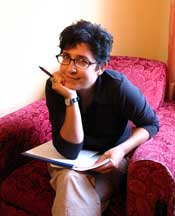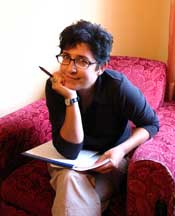 KINGSTON, R.I. – May 27, 2015 – Why does a rainstorm depress some people and make others happy? Why is a sunset heartbreaking for some, breathtaking for others? Why does the music of Joni Mitchell make some weep, others rejoice?
KINGSTON, R.I. – May 27, 2015 – Why does a rainstorm depress some people and make others happy? Why is a sunset heartbreaking for some, breathtaking for others? Why does the music of Joni Mitchell make some weep, others rejoice?
Our moods determine our behavior, but what exactly is a mood and how can it be defined in literature and art?
University of Rhode Island English professor Mary Cappello will explore that question as the recipient of the highly competitive Berlin Prize from the American Academy in Berlin, Germany. She is the first URI professor to receive the award.
Cappello is among 21 writers, artists, historians, scholars and composers chosen from throughout the United States for semester-long fellowships. Cappello will research and write in Berlin this fall.
“Receiving this fellowship is a tremendous honor,” says Cappello, of Providence. “I’m looking forward to the extraordinary opportunity to share my work in an entirely new locale and learn from the groundbreaking work of other fellows in residence and distinguished visitors to the Academy, while experiencing the kind of thinking and writing being produced by artists and intellectuals in Berlin, where I’m hopeful to forge lasting new relationships.”
In Berlin, she’ll explore sound installations and sound study programs as part of her soon-to-be-published book, “Life Breaks In: A Mood Almanack.”
“Sounds touch me, and mood is the window of allowance, wide or narrow, to let sound in,” says Cappello. “My moods are equivalent to what I let myself touch, and be touched by in turn, but also what I have no choice in the matter of being encased in.”
She plans to conceptualize “mood rooms” – with other artists – as alternative performance and meeting places. The rooms would be “mood-inducers,” with moods themselves as invisible rooms – or the mercurial, ever-present dwellings that form people.
“What is mood? Is the idea of the mood room particularly contemporary?” says Cappello. “Does it speak to a pressing need or quest? Would a mood room represent a place of intimacy in an age of fractured attention?”
Mood is the perfect topic for essayists, says Cappello. It is almost impossible to define, yet shapes our motives, acts, beliefs and feelings.
“The challenge of this book from the start has been the impossibility of drawing a line around my subject,” says Cappello. “It’s taken me to places I wouldn’t have anticipated, which is also the pleasure and challenge of the genre I work in – lyric essay.”
The Berlin Prize is awarded annually to scholars, writers, composers and artists who represent the highest standards of excellence in their fields. Fellows receive a monthly stipend, partial board and accommodations at the Academy’s lakeside Hans Arnhold Center in Berlin-Wannsee.
The prize gives recipients the time to step back from their daily obligations to work on academic and artistic projects they might not otherwise pursue, and to engage with their colleagues in Germany. The German newspaper Der Spiegel called the Academy “the world’s most important center for American intellectual life outside the United States.”
Cappello and the other winners were chosen by an independent committee. Other projects include examining East German urban-planning efforts in Vietnam, a small-scale methamphetamine production in rural Missouri and contemporary Islam through the work of Arab poets since World War II.
A professor at URI since 1991, Cappello is the author of four books of literary nonfiction, including “Called Back: My Reply to Cancer, My Return to Life,” – winner of a ForeWord Book of the Year Award and Independent Publishers Prize – and “Awkward: A Detour,” a Los Angeles Times bestseller.
With recent essays in The Georgia Review, Salmagundi and Cabinet Magazine and features in The New York Times, Salon.com, The Huffington Post and on NPR and MSNBC, she is the recipient of The Bechtel Prize for Educating the Imagination from Teachers and Writers Collaborative; the Dorothea Lange-Paul Taylor Prize from Duke University’s Center for Documentary Studies; and a Guggenheim Fellowship.
She is a former Fulbright Lecturer at the Gorky Literary Institute in Moscow, and the recipient of the URI Foundation 2015 Scholarly Excellence Award.
Her most recent book, “Swallow,” emerges from the Dr. Chevalier Jackson Foreign Body Collection in Philadelphia’s Mütter Museum, where she also was co-curator of the re-furbished Foreign Body display. Dr. Jackson was a renowned Philadelphia otolaryngologist who developed methods and tools for removing foreign objects from human airways. The collection includes 2,374 inhaled or swallowed objects that he removed from patients’ throats and lungs.
Cappello also hopes to start work on another book tentatively called, “Waylaid By Interest,” an exploration of the nature of interest and aversion.
Winifred Brownell, dean of the College of Arts and Sciences, says she is “thrilled” that Cappello won the fellowship, calling her one of URI’s “most brilliant and acclaimed writers.”
“The highly regarded Berlin Prize will allow her to interact with outstanding intellectuals from a variety of disciplines, meet with top German artists, scientists and scholars in acoustic studies and complete her book,” says Brownell. “I’m confident that she will contribute significantly and gain considerably from what will be a transformative experience to interact with some of the top minds in the world.”
Pictured above: Mary Cappello, a professor of English and creative writing at the University of Rhode Island. Photo by Jean Walton.

